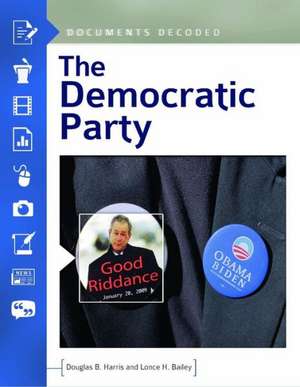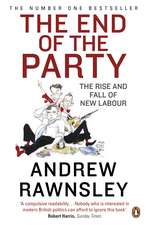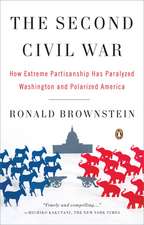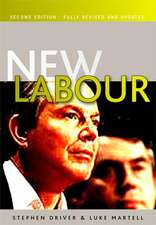The Democratic Party: Documents Decoded: Documents Decoded
Autor Douglas B. Harris, Lonce H. Baileyen Limba Engleză Hardback – 6 oct 2014 – vârsta până la 17 ani
Din seria Documents Decoded
- 47%
 Preț: 377.18 lei
Preț: 377.18 lei - 47%
 Preț: 374.82 lei
Preț: 374.82 lei - 48%
 Preț: 370.53 lei
Preț: 370.53 lei - 47%
 Preț: 374.82 lei
Preț: 374.82 lei - 43%
 Preț: 362.95 lei
Preț: 362.95 lei - 47%
 Preț: 388.50 lei
Preț: 388.50 lei - 41%
 Preț: 388.01 lei
Preț: 388.01 lei - 47%
 Preț: 385.65 lei
Preț: 385.65 lei - 47%
 Preț: 352.72 lei
Preț: 352.72 lei - 42%
 Preț: 349.94 lei
Preț: 349.94 lei - 42%
 Preț: 350.81 lei
Preț: 350.81 lei - 47%
 Preț: 386.60 lei
Preț: 386.60 lei - 51%
 Preț: 361.68 lei
Preț: 361.68 lei - 47%
 Preț: 391.34 lei
Preț: 391.34 lei - 47%
 Preț: 378.13 lei
Preț: 378.13 lei
Preț: 377.48 lei
Preț vechi: 714.40 lei
-47% Nou
Puncte Express: 566
Preț estimativ în valută:
72.24€ • 78.44$ • 60.68£
72.24€ • 78.44$ • 60.68£
Carte disponibilă
Livrare economică 02-16 aprilie
Preluare comenzi: 021 569.72.76
Specificații
ISBN-13: 9781610696432
ISBN-10: 1610696433
Pagini: 312
Dimensiuni: 216 x 279 x 25 mm
Greutate: 1.15 kg
Editura: Bloomsbury Publishing
Colecția ABC-CLIO
Seria Documents Decoded
Locul publicării:New York, United States
ISBN-10: 1610696433
Pagini: 312
Dimensiuni: 216 x 279 x 25 mm
Greutate: 1.15 kg
Editura: Bloomsbury Publishing
Colecția ABC-CLIO
Seria Documents Decoded
Locul publicării:New York, United States
Caracteristici
Details the transformation of the Democratic Party from a small-government party that supported slavery and segregation to a progressive party that defends civil rights and provided the nation's first African-American president
Notă biografică
Douglas B. Harris is associate professor of political science at Loyola University Maryland.Lonce H. Bailey, PhD, is assistant professor of political science at Shippensburg University of Pennsylvania.
Cuprins
Introduction: The Democratic Party's Origins, Evolution, and Transformation, Chapter 1. "Baneful Effects," Good Feelings, and the Rise of Democratic Populism: 1796-1896, Introduction"The Baneful Effects of the Spirit of Party," George Washington's Farewell AddressSeptember 19, 1796"We Are All Republicans, We Are All Federalists," Thomas Jefferson's First Inaugural AddressMarch 4, 1801"To the People Belongs the Right," Andrew Jackson's First State of the Union AddressDecember 8, 1829Maintaining Liberty, Andrew Jackson's Second Inaugural AddressMarch 4, 1833The Popular Will, Democratic Party Platform of 1856June 2, 1856"Our National Destiny," Grover Cleveland's Inaugural AddressMarch 4, 1885"Cross of Gold," William Jennings Bryan, Speech at the Democratic National ConventionJuly 9, 1896Chapter 2. Progressivism, National Purpose, and the Emergence of the New Deal, IntroductionMore Popular Government, Democratic Party Platform, 1912 ConventionJune 25, 1912"What Is Progress?," Woodrow Wilson Campaign Speech1912"We Hold Very Definite Ideals," Woodrow Wilson's Acceptance Speech, Democratic National ConventionSeptember 2, 1916"Liberty under the Law," Al Smith's Democratic Party Acceptance SpeechAugust 22, 1928"I Pledge You-I Pledge Myself to a New Deal for the American People," Franklin D. Roosevelt's Democratic Party Nomination SpeechJuly 2, 1932"The Candidate Discusses the National Democratic Platform," Franklin Delano Roosevelt Campaign Radio AddressJuly 30, 1932"The Only Thing We Have to Fear Is Fear Itself," Franklin Delano Roosevelt, First Inaugural AddressMarch 4, 1933"Four Freedoms" Speech, Franklin Delano Roosevelt's State of the Union AddressJanuary 6, 1941Chapter 3. The Cold War and Civil Rights: Transitions to the Modern Democratic Party, IntroductionThe Truman Doctrine, Harry S. Truman, Address before CongressMarch 12, 1947"The Bright Sunshine of Human Rights," Hubert Humphrey's Address to the Democratic National ConventionJuly 14, 1948Desegregating the Armed Services, Harry S. Truman, Executive Order 9981July 26, 1948Whistle-Stop Tour, Harry S. Truman's Campaign Speech, Trenton, MissouriSeptember 18, 1948Southern Manifesto, Declaration of Constitutional PrinciplesMarch 12, 1956"This New America," Adali Stevenson's Democratic Convention Nomination Acceptance SpeechAugust 17, 1956"Ask Not What Your Country Can Do for You," John F. Kennedy, Inaugural AddressJanuary 20, 1961The Great Society, Lyndon B. Johnson's Speech at the University of MichiganMay 22, 1964"I Question America," Fannie Lou Hamer's Testimony to the Credentials Committee, National Democratic ConventionAugust 22, 1964"We Must Seek the Courage," Lyndon B. Johnson's Democratic National Convention Acceptance SpeechAugust 27, 1964"There Is Only an American Problem," Lyndon B. Johnson, Speech before Congress on the Voting Rights ActMarch 15, 1965Chapter 4. Democrats in Disarray: Vietnam, New Politics, and the Reagan Era, Introduction"The Present Divisions within Our Party," Senator Robert Kennedy, Announcement of Presidential CampaignMarch 16, 1968Announcement of the Assassination of Martin Luther King Jr., Robert Kennedy, Campaign StopApril 4, 1968"Democracy Affords Debate, Discussion and Dissent," Hubert Humphrey's Nomination Acceptance Speech, Democratic National ConventionAugust 29, 1968"Come Home America," George McGovern, Nomination Acceptance Speech, Democratic National ConventionJuly 14, 1972"Restore the Social Intercourse," Barbara Jordan's Keynote Address to the Democratic National ConventionJuly 12, 1976A United Democratic Party, Jimmy Carter's Nomination Acceptance Speech, Democratic National ConventionJuly 15, 1976"Crisis of Confidence," Jimmy Carter, Address to the Nation regarding the Energy CrisisJuly 15, 1979"Tale of Two Cities," Mario Cuomo's Keynote Address to the Democratic National ConventionJuly 16, 1984The Rainbow Coalition, Jesse Jackson's Keynote Address at the Democratic National ConventionJuly 18, 1984Chapter 5. New Democrats: Building a Bridge to the 21st Century, IntroductionNew Orleans Declaration, Statement Endorsed at the Fourth Annual Democratic Leadership Council ConferenceMarch 1, 1990A New Covenant, Bill Clinton's Address Accepting the Democratic Presidential NominationJuly 16, 1992"There Is Not Room," Richard Shelby's Press Conference Announcing Party SwitchNovember 9, 1994"The Era of Big Government Is Over," Bill Clinton's State of the Union AddressJanuary 23, 1996"We're for the People," Al Gore's Acceptance SpeechAugust 17, 2000"Bring America Together," Al Gore's Concession SpeechDecember 13, 2000Preparing for the 21st Century, Bill Clinton's Farewell AddressJanuary 18, 2001Chapter 6. Resigned to Opposition: Democrats in the George W. Bush Years, IntroductionChanging Senate Leadership, Richard Durbin Speaks about James Jeffords's Party SwitchMay 24, 2001"America Suffers Today," Richard Gephardt's Speech after the 9/11 Terrorist AttacksSeptember 11, 2001"Both Parties Stand United," Tom Daschle's Speech after the 9/11 Terrorist AttacksSeptember 12, 2001"Today I Weep for My Country," Robert Byrd's Speech on the Iraq WarMarch 19, 2003"Reporting for Duty," John Kerry's Nomination Acceptance SpeechJuly 29, 2004The Democratic Vision, Democratic Responses to George W. Bush's State of the Union AddressFebruary 2, 2005"Let Us Be the Congress," Nancy Pelosi's Speech upon Taking the Oath of OfficeJanuary 4, 2007Chapter 7. Making History: Hope and Change in the Rise and Reign of Barack Obama, Introduction"We've Changed This Country Before," Barack Obama's Announcement of CandidacyFebruary 10, 2007"I Am Still Standing," Hillary Clinton's Remarks at the New Hampshire Democratic Party 100 Club DinnerJanuary 4, 2008"Yes We Can," Barack Obama's Remarks on Election NightNovember 4, 2008"This Is the Meaning of Our Liberty," Barack Obama's First Inaugural AddressJanuary 20, 2009"We Are a Nation That Does What Is Hard," Barack Obama and Joe Biden, Remarks at the Signing of the Health Insurance Reform BillMarch 23, 2010"Justice Has Been Done," Barack Obama's Remarks on the Death of Osama bin LadenMay 2, 2011"Our Journey Is Not Complete," Barack Obama's Second Inaugural AddressJanuary 20, 2013Timeline, Further Reading, Index, About the Authors,
Recenzii
This book's unique and chronological approach in aligning key historical documents side-by-side with modern-day commentary facilitates an active relationship between readers and the material at hand. . . . This book is recommended for high school and academic libraries.


















